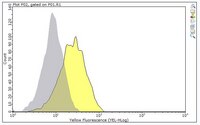MABC1133-100UL Sigma-AldrichAnti-Mucin13 Antibody, clone C14
Anti-Mucin13, clone C14, Cat. No. MABC1133, is a mouse monoclonal antibody that detects Mucin13 and has been tested for use in ELISA, Flow Cytometry, Immunocytochemistry, Immunoprecipitation, Inhibition Analysis, and Western Blotting.
More>> Anti-Mucin13, clone C14, Cat. No. MABC1133, is a mouse monoclonal antibody that detects Mucin13 and has been tested for use in ELISA, Flow Cytometry, Immunocytochemistry, Immunoprecipitation, Inhibition Analysis, and Western Blotting. Less<<Produits recommandés
Aperçu
| Replacement Information |
|---|
| References |
|---|
| Product Information | |
|---|---|
| Format | Purified |
| Presentation | Purified mouse monoclonal antibody IgG in PBS without azide. |
| Physicochemical Information |
|---|
| Dimensions |
|---|
| Materials Information |
|---|
| Toxicological Information |
|---|
| Safety Information according to GHS |
|---|
| Safety Information |
|---|
| Packaging Information | |
|---|---|
| Material Size | 100 µL |
| Transport Information |
|---|
| Supplemental Information |
|---|
| Specifications |
|---|
| Global Trade Item Number | |
|---|---|
| Référence | GTIN |
| MABC1133-100UL | 04061841099185 |
Documentation
Anti-Mucin13 Antibody, clone C14 FDS
| Titre |
|---|
Anti-Mucin13 Antibody, clone C14 Certificats d'analyse
| Titre | Numéro de lot |
|---|---|
| Anti-Mucin13, clone C14 - Q3308326 | Q3308326 |












